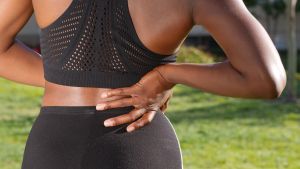Herniated Disc

A herniated disc is one of the most common causes of back, neck, and leg pain. In addition to the term herniated disc, this may also be called a bulging disc, ruptured disc, or slipped disc. Herniated discs can cause serious back pain so finding a solution is a must for people experiencing this medical issue.
One good thing about herniated discs is that treatment is often simple and non-invasive. Some people will find the bulging disc starts to heal all on its own. In other cases, home care is enough to rectify the problem.
To put things into the simplest terms, a herniated disc is defined as an injury to the backbone or spine. Humans have a series of vertebrae (or bones) in the spine. These start at the base of the skull and move down to the tailbone.
Around each of the vertebra are discs, which are similar to round cushions. The discs are what act as a buffer to the bones. They ensure you can move and bend however you need to. However, when the disc starts to leak or experiences a tear this is a herniated disc.
There are two major things to keep in mind when it comes to the risk factors for a herniated disc. The most common individuals to experience a herniated disc are those between the ages of 30 and 50. In addition, it is two times more likely to happen to men than women. Additional risk factors include:

- Lifting heavy objects
- Obesity
- Repetitive twisting and bending motions for hobbies, sports, or work
- Sitting in the same position for long periods
- Smoking
The symptoms of a herniated disc will vary based on where the slipped disc is on your spine. When moving, symptoms often get worse. Resting can make them better. If the herniated disc is in the lower back, you may feel a sharp pain originating from one of the buttocks and into the leg or foot. Other symptoms can include muscle weakness, back pain, and numbness or tingling in the feet or legs.
Other people experience a herniated disc that is closer to the neck. This will have different symptoms than a lower herniated disc. Instead, you may feel neck pain, especially on the side and back of the neck. Other symptoms may include pain between or concentrated near the shoulder blades or pain that move across the shoulder and arm or into the fingers and hand.
If rest and home remedies don’t do the trick, there are several ways to manage your symptoms. You might be prescribed a muscle relaxant or an anti-inflammatory pain reliever. Physical therapy can also be used to great success. Some people will choose a nerve block or spinal injection to reduce swelling. Surgery is also a possibility but rarer than other treatments.
Those who have a herniated disc do not have to live a life of pain and discomfort. Modern Pain Consultants are here to help. We’ll diagnose you, choose an individualized treatment plan, and get you on the road to a life without pain. Reach out to us today for more information or to set an appointment.

